Subscribe Apple | Google | Spotify | Stitcher | iHeart Living the Dream Overseas with Christine Gritmon Have you had a lifelong dream to live overseas and haven't made that happen yet? Maybe things have gotten in the way like family, jobs, life. My...
Ep137 Transcript: Interview with Julie Cairns
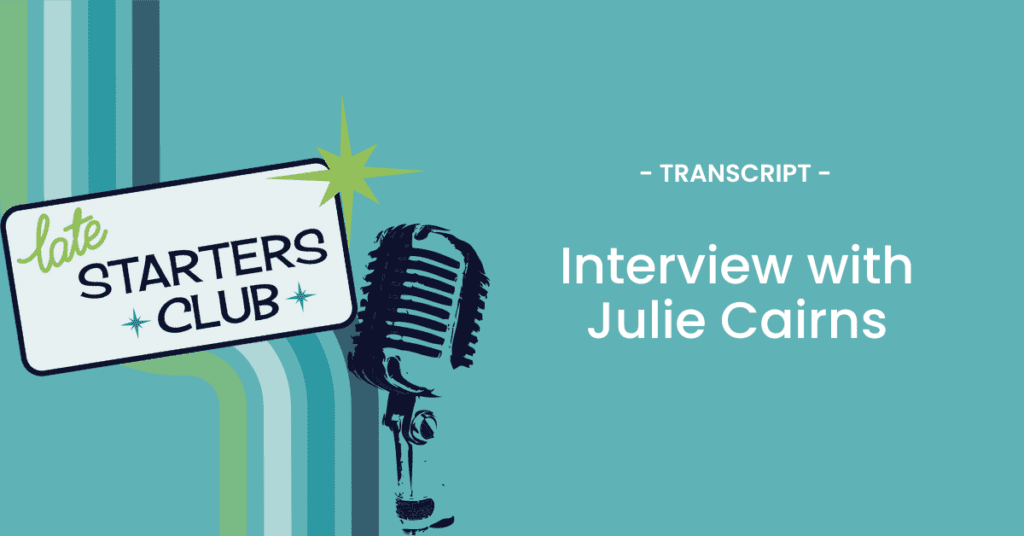
Andrea Vahl: Have you ever thought about making a movie? How about running a multimillion dollar company or writing a book? My guest today, Julie Ann Cairns, has done all three of those. Listen in as we talk about her amazing story with her book and movie, The Abundance Code, in my interview today.
Hello, dreamers. Welcome to the late starters club, giving you the inspiration, mindset, and tools you need to start something midlife and beyond remember, it’s never too late to follow your dreams.
Hello, late starters. It’s your host, Andrea Vahl. And I am joined today by the amazing Julie Ann Cairns. She is someone I’ve known for a while. She is so inspirational. And actually, Julie Ann, I think I read your book before you became a coach in our launch club space, and I just love it. She is the author of the abundance, the bestselling Hay House book, The Abundance Code.
And she is the director of the documentary series of the same name. It’s available on Gaia.com. So welcome Julie Ann.
Julie Ann Cairns: Hey, thanks for having me, Andrea. So cool.
Yeah, I
Andrea Vahl: know. It’s so fun. And I’m excited to dive into our topic cause there’s so much that goes with all of this. Why don’t you start by giving us just a little bit of background about the book and then we’ll dive more into the movie because that has got some interesting history there and story that I didn’t know about until we were just talking.
So I’m excited.
Julie Ann Cairns: Cool. All right. My background is I grew up in Canada. Had spent my childhood in Canada. My parents were quite wealthy when I was a young child. My father was a very prominent surgeon and my parents had invested in real estate and done quite well. And so I had this very privileged childhood where we had pretty much everything we could want, beautiful house, cottage, boats, planes, they had two airplanes yeah my brother was sent to the most exclusive private school, all of that stuff.
And then when I was 11 years old, my parents marriage disintegrated.
Prior to that, they had started drinking quite heavily. So I’d have to say from about the age of eight, things had started to get very dicey.
And then finally, a big implosion when I was 11, I ended up living with my mom who I think by the time I was 13 declared bankruptcy, all the money was gone. I don’t even know where and suddenly we were living being assisted by welfare. So I had this very massive shift in my experience around money as a child.
And in my formative years. And that was very eyeopening because I had experienced as a child we didn’t, we lived in an area, a rural area where not everyone had money like we did. And I went to a rural school where certainly most of the kids were not from a wealthy background. And so I experienced kind of the attitudes of people who don’t have money towards someone who does have money.
On the one hand and then, when the shoe was on the other foot, I got to experience the other side of it because although we were living on welfare we lived in a relatively affluent area. Yeah, so that was odd too. And I got to see both sides of it and that gave me, a fascination with the topic of money.
And, I remember thinking, deciding when I was about 15 years old, cause I spent a couple of years after all the money was lost being depressed. And I remember when I was 15 years old, I’m like, okay, no one’s going to sort this out for me. I didn’t have to do this.
I’ve been poor, I’ve been rich, I’d rather be rich, definitely. What am I going to do? And at that time, the things that were available to me were the standard path that is laid out for everyone which is go to school, study hard, go to a good university study finance or something like that.
So I decided to follow the path that had been laid out to me by society, which is study hard, go to school, go to a good university, probably study something like finance, which is exactly what I did get a good job at a bank or, an investment bank, which is what I did do all those things in order to get wealthy.
And I followed that path. And ended up not only working in the field of finance and merchant banking for a good period of time, but then also started my own company with a business partner, teaching people how to trade the financial markets. And that was successful. We made millions of dollars and then 2008 rolled around financial crisis.
And through a series of events. It’s not too hard to imagine we were on the verge of bankruptcy. And it was an incredibly scary time for me, because not only was my business on the verge of bankruptcy, but my daughter had been in hospital, had nearly died. And my husband, who was my business partner, decided that he wanted to transition to become a woman.
So all of these things happened all at once in my life. And it was an absolute crisis. For me and I remember really introspecting at the time, like, how did I even get here? What, what is going on, man? And one of the ahas that I had was I felt this pit of terror in my stomach. And I tuned into it and I went, wow, this actually, this feeling’s quite familiar.
When did I last feel this feeling and when did I first feel this feeling, which are really powerful questions, actually, when you’re tapping into what’s going on with you. And I immediately realized I had felt this when I was 11 years old and my family situation was completely imploding. I had felt the same kind of terror.
And then I had an aha, which was, oh my gosh, we had wealth, we lost wealth. I have had this roller coaster of financial gain and loss, which I had. I’d had a couple of massive gains and losses before this 2008 incident. And now I’m on the verge of bankruptcy. Oh my God. Do I think that this is how it goes?
Is this the pattern I’m locked into repeating for the rest of my life if I don’t change something like what and what do I need to change? How do I get out of this pattern that is exhausting and crazy and I don’t want to be doing this anymore? And that thought led me to diving into understanding the subconscious mind and what are the subconscious beliefs and patterns that drive our behavior that we’re not even aware of just drive decisions that we’re not even aware are being driven by these things that are, from our past conditioning.
And that investigation really is what led me to write the book, The Abundance Code, because when I was able to change my subconscious programming, I went from being about 3 million in debt and on the verge of bankruptcy, rewired my subconscious, spent a lot of, good time and effort doing that.
And then within four years had turned it all around so that not only was I not in debt, we had 3 million in cash in the bank. So that was a 6 million turnaround in about four years in what was effectively a recession after the 2008 global crisis.
Andrea Vahl: Wow. That is just so amazing, right? It’s so amazing and I think it’s just, I love what your book did for me as well.
Just, really diving into the past stories we have and the history and our, the thought patterns that come up because I think it’s a huge shift that you don’t even know is going on in your brain. It’s just, it’s amazing.
Julie Ann Cairns: Absolutely. There’s a lot to what is going on in the unconscious and how much it’s driving what’s and that can be good and bad.
And this is what I really want people to understand is that, our subconscious is not some, tricky shadow demon that we have to vanquish. We can, yes. There’s code in our subconscious minds, just like computer code is running your computer, right? And it enables all kinds of functionality that is fantastic, but a bug in there is going to shut the whole thing down.
And, the vital things don’t work and our subconscious is very similar. If we have buggy code in there, it’s really important to go and sort that out so that incredible machine, which is our consciousness can operate at optimal efficiency. And the subconscious mind, the power of the subconscious mind is something like 500 times 500 million times, more powerful than our conscious decision making abilities, right? So the more that we can shunt to our subconscious and let it just take care of things, actually the freer and more. The more easily and more in flow we feel right. And things just start going great and we see opportunities and we’re able to take advantage of them.
And it’s absolutely incredible when you get that machine running the way it’s supposed to run. It’s breathtaking. And the thing that I really wish people understood is that subconscious reprogramming is not that hard.
Andrea Vahl: That’s, that is incredible news. Subconscious reprogramming is not that hard.
That’s a whole podcast in itself right there. But I want to get to, this is awesome and I love your book and I will have the link to the book in the show notes. Of course. It’s at the abundance code, the book, right? No, I’m sorry.
Julie Ann Cairns: The abundance code book. com.
Andrea Vahl: The abundance code book. com. I’ve read it twice. I feel like now I want to read it again. And but now I want to talk about like, how did that, how did you move from the book to the movie? Was that always the plan? Did you say, now I’ve written the book, we need to make this into a movie. Tell us about how that developed and have you, and just even the thought of directing a movie? That’s scary.
Julie Ann Cairns: Absolutely. When the thought of directing the movie came, it, I had already been writing the book and the book, I already had a publishing deal for the book, so that was all underway. But the funny thing about, I never thought that i would go on to make a docu series. It was not in my mindset at all.
I’m quite my, as you can judge by my history of, studying finance and economics and the stock market I’m a very analytical person naturally. And I wasn’t really the kind of person who would go, I’m going to take on this massive creative project.
It ended up having all these creative elements in it. There was a storyline, an enacted storyline with actors scripted storyline, there was animations. That, had to be creatively directed. There was a song which I wrote, there was like all these creative elements and this was not something that was in my consciousness that like, Oh, I’m so good at this creative stuff.
To go do this, right? That’s not what happened at all. What happened is freaky and bizarre. I did have a desire, a strong desire, which is why I wrote the book to share a message of there is an abundant way of thinking and being in the world that is completely different way of being and thinking to what we have been conditioned to by society, by the education system et cetera.
And let’s just touch on what that conditioning is for a second, right? Because I like to make a very clear distinction between what is the scarcity mindset and what is an abundance mindset. And a scarcity mindset, that’s really the one that we’ve been, most of us have been raised in, which is the mindset that says, essentially, there is not enough to go around.
That’s like at the very heart of this mindset, there’s not enough to go around. And so if there’s not enough to go around, there’s not enough for everyone to have everything that they want. Then what that means is I have to compete for, if I want a bigger share of the pie. I have to compete and I have to compete quite fiercely and what that then kicks up is a whole range of emotions and behaviors around jealousy, around envy, around anxiety keeping up, needing to perform comparisonitis measurement.
And how am I doing all of that? Am I on track? Am I going to get more? Am I going to get more? It’s this whole thing that is. Born out of this essential core idea. There is not enough. And underneath that idea, if you want to get into, deeper psychology is I am not enough. I am not enough just the way that I am.
I’m going to have to prove myself. I’m going to have to strive. I’m going to have to struggle all that stuff. So that’s the scarcity mindset. And I think it’s familiar to all of us.
The abundance mindset comes from a completely different place. It comes from, there is more than enough to go around.
We live in an abundant system. This planet is abundant. We don’t have to tell the plants to grow. They just grow it’s not in my garden though. I, Okay, we don’t have to tell the weeds to grow. They just grow.
Exactly. And it’s like this idea that actually there is more than enough to go around. I do not have to fight and compete with you. We can help each other. All, rising tide lifts all boats. We can live in a place where that is true. We can collaborate, collaborate, we can create, we can be abundant.
That is the abundance mindset, right?
And I was really exposed to the abundance mindset, not only through my life experiences, this stark difference between scarcity thinking and abundance thinking, but also I had been in Jeff Walker’s. Mastermind group for about 10 years and Jeff Walker is. In the internet marketing space, we both know Jeff well, Andrea and mentor for both of us, and he has an incredibly abundant way of thinking and through Jeff’s mastermind group, I met a lot of other people who have abundant ways of thinking because those are the kind of people that he attracts into his life and then once I had that frame really wired in, To my own consciousness, then I just started attracting people like that into my life and it became this self fulfilling positive spiral.
And so I really wanted to communicate to people that this spiral exists, this positive spiral exists and it’s incredible and the things that it unlocks when you step into this positive spiral and let yourself go with it is. Is amazing and life changing and beautiful and yeah incredible. And so I did feel very called on a spiritual level to share that message with the world.
And then I got into a car accident. I was rear ended at high speed. And I got a traumatic brain injury and what it caused was for basically my analytical function, the left brain function was very impaired for a while there for a long while, and I shifted more into my right brain creative capacity, which is, it’s a thing that happens.
It’s a documented thing that can happen with traumatic brain injury. I’ve heard that as well. And all of a sudden. I was in this kind of possibility space that didn’t really have as much risk analysis and analytical. It was a gorgeous possibility. And it was from that space that I was like, I want to make a movie.
And I said to my friend, Michael Maidens at the time, Hey Michael, do you want to make a movie about abundance? And Michael is in this possibility about in space, like all the time.
And he’s yeah, let’s do it. So we just started. So it was amazing how it came about.
Andrea Vahl: Yeah, that’s awesome.
And then did you did you like work specifically with Gaia to, did they pick it up or is that…?
Julie Ann Cairns: Again, that would have been a very analytical business planning thing to do at the time. It was literally just, I’m just going to make it middle, which it obviously has. It’s an incredibly popular title and that’s great.
But at the time, I didn’t. Even know how I never made a film before. I knew nothing about making a film. I didn’t know how to budget for it I did set a bunch of money aside a couple of hundred thousand I thought it’s probably gonna cost about 200, 000 to make this film and that was wrong.
And That was very wrong. That was not enough and Also, because I guess I was not in my analytical mind very well at that time I messed up my taxes and all of that money that I put aside was like, poof, it was gone. All of a sudden I was like, Oh no what am I going to do?
Andrea Vahl: And so did you think, yeah, did you think it like I, maybe we should give up or maybe we should stop? Or was it too, were there any thoughts like that. That’s probably just shut it down, right?
Julie Ann Cairns: That would have been logical. No, I didn’t think I just kept, you know what I kept doing? I just moved forward as if the money was going to show up. And I was signing contracts like, yep, this is all going to be good and committing to things.
And I did not have the money in the bank to be committing to those things. And I did it anyway. And then literally at the 11th hour, all the money that I needed to do, it showed up in a variety of ways, like for example Michael Maidens put in a lot of time, a lot of extra time that he did not get paid for.
We had an investor come on board and then at the, it still wasn’t enough. And at the 11th hour, 1159, I would say I got. The settlement from the insurance claim from the accident that caused the brain injury that caused me to go into my right brain to inspire the project in the first place. That is what paid for the project.
Andrea Vahl: Wow. That is total synchronicity right there. I had I interviewed a man who got Philip Merry who got his PhD at age 69 and he studied synchronicity and I just. That is, wow. Incredible.
Julie Ann Cairns: Yeah I look back on it and that whole period. Because, I did make the film. I did step up into the role of director.
I did, incredible things that I had no idea I was capable of and afterwards, I was quite tired for a while. It did take a lot out of me, but I look back at that whole few years. From the accident to, the launch of the docu series and it is incredible to me. It’s almost like that happened to someone else.
Like it’s so bizarre and yeah, that it’s still gobsmacking to me.
Andrea Vahl: And was there a point during the filming? Obviously there’s probably lots of little points, but was there a single point where you’re just completely overwhelmed with it all? And, weren’t sure how to move forward and just…?
Julie Ann Cairns: A hundred times.
Oh yeah, absolutely. And, I just dug really deep. Michael Masons dug deep. There was so many people on the project. It was not me myself. Alone doing this by any stretch, there were a ton of creative people who just flocked to this project and I’m so incredibly grateful and I guess that’s how I know this wasn’t about me.
Like I really felt like I was an instrument being used for the higher purpose of that project. And the feedback that we got afterwards. Was just incredible. Even had someone write to me saying you stopped me from committing suicide. That film stopped me from committing suicide.
I’ve had people that I’ve met in the subsequent years later. I moved to Queenstown years later and and this lady reached out to me on Facebook. And she said, can I meet up with you for coffee? So we met up and she said she was living in Chile. She was in a, an abusive relationship. She had a teenage son.
She didn’t know what she could do to change her life. But that it had to change. She watched that docu series and she said, that was the moment that I started to believe it was possible. To have a different life and then fast forward, she’s living in Queenstown. She’s in a beautiful new relationship.
She’s got an investment property. She is living a life of abundance and yeah, she said that was the turning point for me.
Andrea Vahl: Yeah, that’s awesome. That’s awesome. And how long did it take to make the movie? How many, how long was this period of time?
Julie Ann Cairns: Three years.
Wow. Wow. Three years.
Andrea Vahl: That’s incredible.
Julie Ann Cairns: It was a whole incredible process. And part of the, that it taking three years is cause I. It was not a professional filmmaker, but we got there in the end.
Andrea Vahl: That’s amazing. I want to circle back to one of the things that you talked about earlier because I wanted to make sure we got to that, that amazing, backstory of the film and everything and how that all came about.
Cause I think that’s an amazing story for anyone who’s looking to do something creative like this. It’s it can work out. I don’t, you can do it, you can do it with no experience, right? That’s the amazing, beautiful tale. But I want to circle back to you had talked about rewiring.
Your subconscious is not that hard to do. What are maybe just a couple of the first steps someone needs to take to rewire your subconscious?
Julie Ann Cairns: There’s, okay. So I did a lot of research on this. Back when I was doing the process myself and also doing the research for the book and of all the processes I studied, I could boil them all down to three essential steps.
The first step to any belief change is identifying the belief. And this is actually the hardest step because the belief is often subconscious. So it resides below your level of conscious awareness. And so how do you grab hold of something that is. subconscious. And basically how you do that is you identify, you look for patterns in your life, repeating patterns.
And that’s going to be a clue, particularly if it’s a repeating pattern that you do not leave those alone. Please don’t repeating
patterns that are not fun. Then it’s about identifying, okay, that’s a pattern that’s happened over and over again in different guises, but it’s essentially the same thing happening over and over again. And then what is it? What might I believe that is causing that repeating pattern? So that was like my aha.
Do I believe that this gain and loss cycle that wild gains and losses that I’ve experienced my whole life? Do I believe that’s normal? So that’s step number one. Step number two is to weaken that belief. You don’t have to erase it. You don’t have to completely, annihilate it. You just have to weaken the absolute hold that it has.
On your thinking, crack the back of it. If you like, that little crack will let the light in and then the light will do the rest. So crack the back of it and how you do that is the easiest way I find is to argue the counter case, just sit down and go, okay does, is this gain and loss cycle?
For example, my example. Normal? No, it is not. I do not see other people going through this crazy gain and loss cycle, so it’s not normal for other people. Is it, has it always been the case for me? No, before it got wired in when I was a kid, I just experienced, carefree life was good. I wasn’t in this crazy roller coaster, so I also have the knowledge of an experience outside of that.
Rollercoaster. So it’s not absolute. It’s not true always for me. It’s not true for everyone. It doesn’t have to be true for me moving forward. If I choose for it not to be okay. So I’ve cracked the back of it. And then the third step is. To wire in a belief that is going to be supportive of me, my, my belief was a version of easy come, easy go money is easy come, easy go is a version of that.
And so the subconscious loves rhyming. So it is, the subconscious loves simplicity, so it is good to stick with something simple. Rhyming really helps. So I moved to money is easy, come easy, grow instead of money is easy, come, easy, go.
Andrea Vahl: Exactly. I think the second one sounds better.
That’s awesome.
Julie Ann Cairns: That’s an example of the three steps.
Andrea Vahl: That’s great. And for people who are interested in more, definitely check out Julie Ann’s book. Check out the. Check out the movie for sure on Gaia. com. We’ll have links in the show notes, but I have to say it’s just, it’s amazing and it’s interesting to see what kinds of beliefs you don’t even know are there. I’ve had this belief for a long time about I have to work hard for the money. It’s one of those, so
Julie Ann Cairns: That is very common. That’s one of the seven that I go through in the book. So…
Andrea Vahl: definitely. So good. This has been amazing. I always like, I, some of these interviews, I just I’m like, we could just talk all day, all four, four hours, just four hour podcasts. That’s all.
Julie Ann Cairns: Right.
Andrea Vahl: But I do like to ask all of my guests, some of their favorite or one or more some people are giving to you, but one favorite motivational or inspirational saying or quote that really inspires you.
Julie Ann Cairns: Yes, I have one and it is from Rumi and the, it’s, it sums up a lot of what we’ve been talking about here.
And let me just give it a bit of context quickly, if you don’t mind, because when it comes to, the question of how can I get wealthy? The most automatic response is I’m going to do this and I’m going to do that and I’m going to do the other thing, right? People go to knowledge or or I need to learn this or learn that, right?
So they go to knowledge and action instead of going to What do I need to change in my belief system so that I can do things more easily so that I can have better flow so that I can be more congruent with my goals and not sabotage them. It’s not natural to go to what, how, it’s not what I need to do differently.
It’s what I need to believe differently, right? And that is the core message. So this quote sums that up yesterday. I was clever. So I wanted to change the world today. I am wise. So I am changing myself.
Andrea Vahl: I love that. Oh, I love that. I’ve heard that one before, but I just it always, I’m such, I love quotes so much.
And I just love to be reminded of them and hear them again. And there it’s just, that is. Beautiful.
Thank you so much for being on the show and for your work in the world and bringing forth a film when you didn’t even know how to do that. But I’m definitely going to go check it out on Gaia.
com and I also want to go read your book again. So encourage anyone listening to go and do the same. And so thank you so much, Julie Ann, for being with us.
Julie Ann Cairns: Thank you.
Hope that was helpful and make sure you grab the free guide top tools for late starters on the website at late starters club. com and let’s turn dreaming into doing.
Join the conversation.
Let us know what you think about this episode.
Never miss an episode.
Subscribe to the podcast
You may also enjoy…
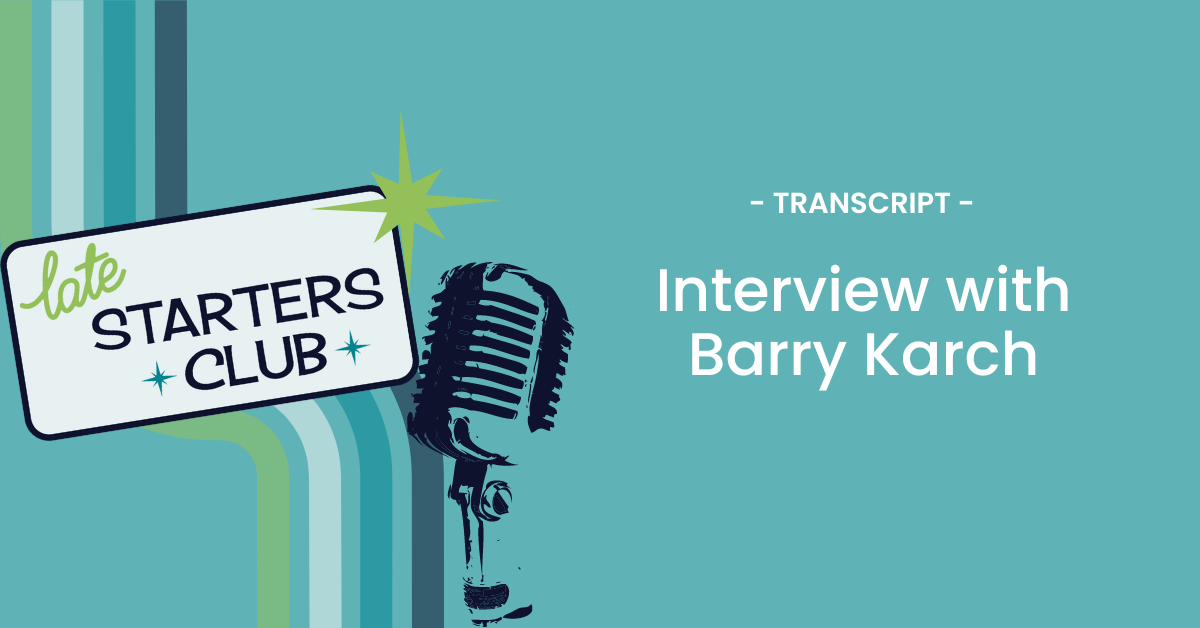
Ep170 Transcript: Finding New Motivation with Barry Karch
Finding New Motivation with Barry Karch Andrea Vahl: It's never too late to restart something you loved. My guest today, Barry Karch, started training for a marathon after a 20 year hiatus. And we'll also dive into how he climbed the equivalent of Mount Everest...
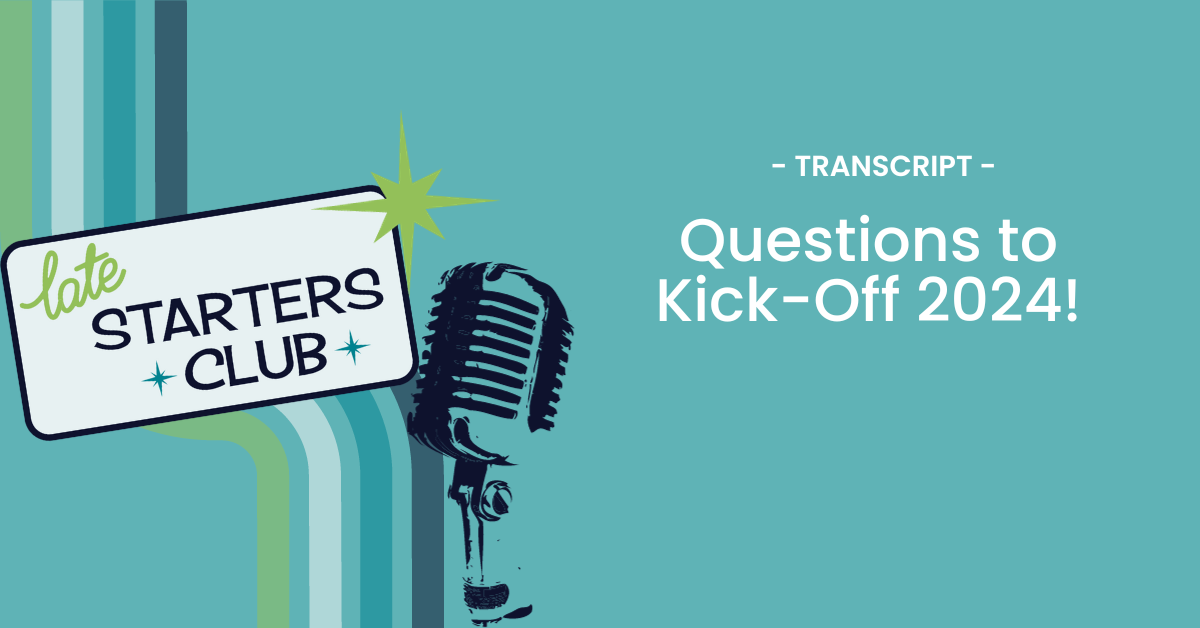
Ep169 Transcript: Questions to Kick Start 2024
Andrea Vahl: Oh, happy new year. Yeehaw. 2024. All right. I don't know about you, but I love planning out my year and setting goals and really reflecting on how my past year went and being super intentional about what I want the next year to look like. In today's...
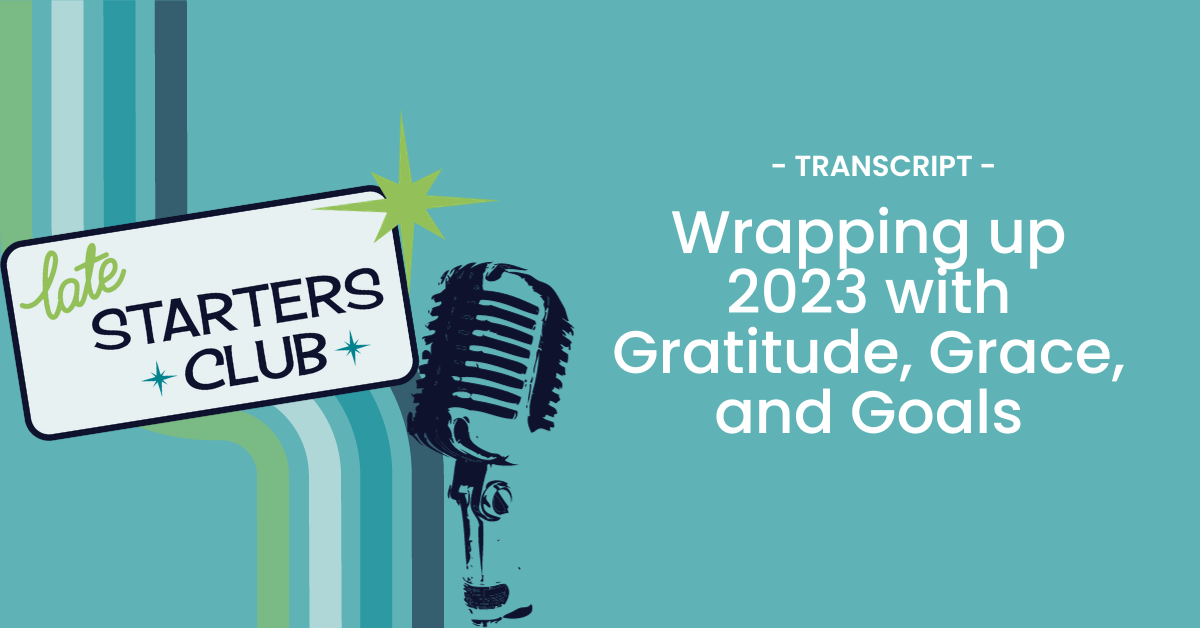
Ep168 Transcript: Wrapping up 2023 with Gratitude, Grace, and Goals
Hello, late starters. It's your host, Andrea Vahl And today is Christmas day. And if you do celebrate that Merry Christmas, if you celebrate some other holiday, I wish you all the best and all the joy for that. I just wanted to make a different episode. So today we're...
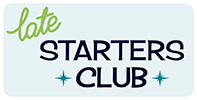
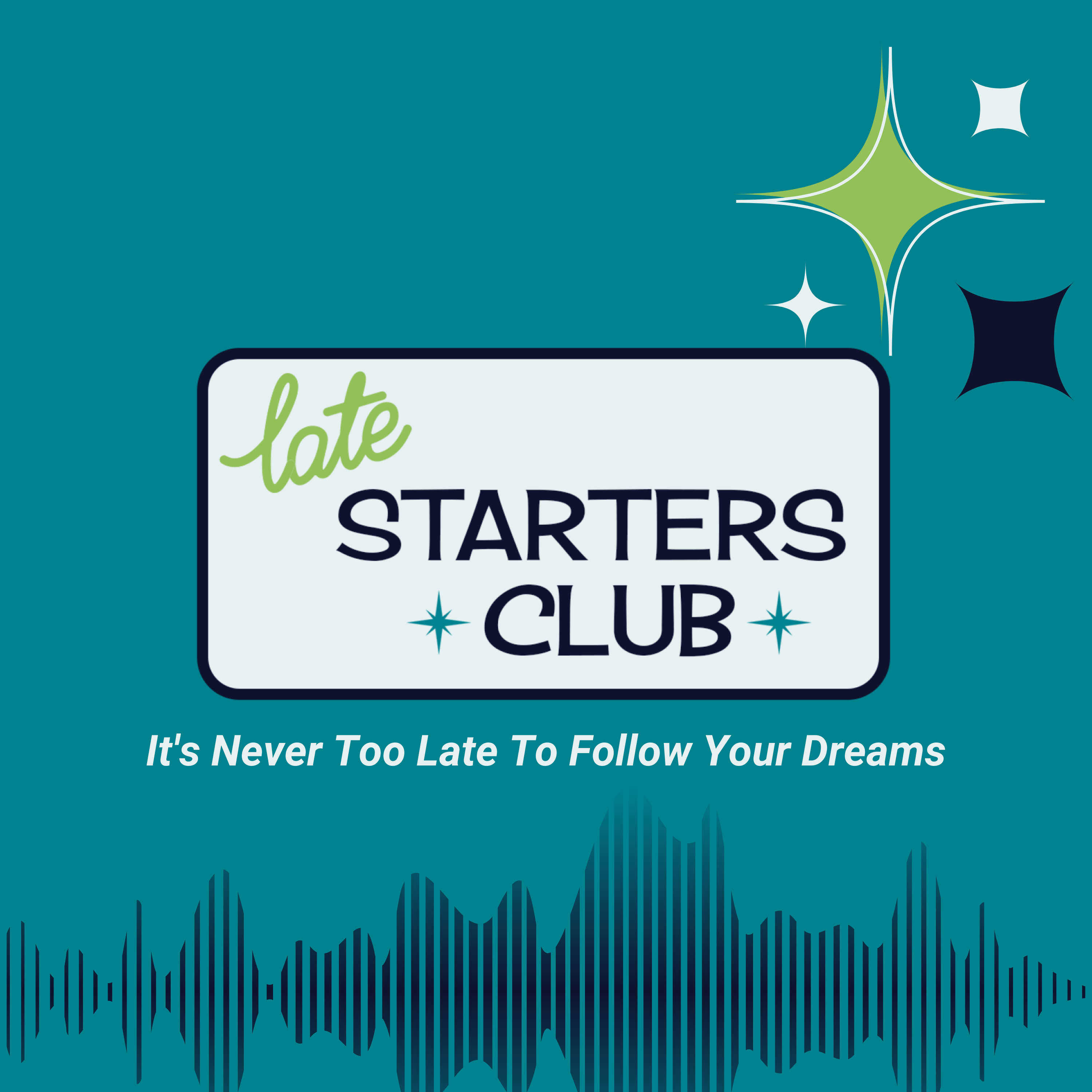
0 Comments